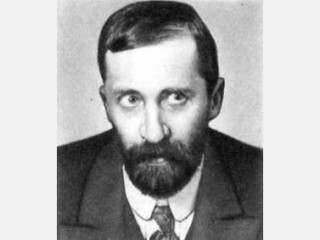
Dmitry Merezhkovsky biography
Date of birth : 1865-08-02
Date of death : 1941-12-09
Birthplace : St. Petersburg, Russia
Nationality : Russian
Category : Famous Figures
Last modified : 2011-02-22
Credited as : Writer, and literary critic, The Reign of Anti-Christ 1926
The Russian writer and literary critic Dmitry Sergeyevich Merezhkovsky, a founder of the modernist movement in Russian literature, combined fervent idealism with literary innovation.
Dmitry Merezhkovsky was born in St. Petersburg on Aug. 2/14, 1865, into the family of a minor court official. Even before graduating from the university there, he began (1883) publishing in liberal magazines poems in the prevailing style and civic spirit of Semyon Y. Nadson. The appearance of Merezhkovsky's first book, Poems, in 1888, the year after Nadson's death, suggested that he was Nadson's successor, but in 1892 he published another book of verse provocatively entitled Symbols and in 1893 a small critical book, On the Reasons for the Decline of and on New Currents in Contemporary Russian Literature. Rejecting sociological criticism and socially oriented verse, these two books affirmed a new quasi-religious philosophy and a fresh literary manner. With his young wife, the temperamental red-haired poetess Zinaida Hippius, he served on the board of the magazine Northern Messenger, the first herald of the new movement.
Merezhkovsky's first popular presentation of his antithetical religious views was the trilogy Christ and Anti-Christ, of which volume 1, The Death of the Gods: Julian the Apostate, appeared in 1896, followed by The Resurrection of the Gods: Leonardo da Vinci in 1901 and Anti-Christ: Peter and Alexis in 1905. The books' persuasive power came from Merezhkovsky's success in catching currents then around him: strong contrasts between social life and spiritual values, fresh interest in the drama of pagan ancient Athens, and identification with general western European culture. His translations of Daphnis and Chloe and works of Pliny, Marcus Aurelius, Miguel de Cervantes, Gustave Flaubert, and Henrik lbsen, among others, were valued contributions to Russian literary sophistication.
Merezhkovsky's application of his critical principles to Russian literature in his Christ and Anti-Christ in Russian Literature: Tolstoy and Dostoyevsky (1901-1903) imaginatively, if tendentiously, analyzed West versus East, flesh versus spirit, in the Russian literary tradition. Even recently, outside of the Soviet Union, critics who reject both the utilitarian attitude of the naturalist school and the structural subtleties of the formalist school have repeated Merezhkovsky's method of explaining a writer's work through biography, metaphor, and religious values.
Merezhkovsky and his wife collaborated with D. V. Filosofov, with whom, in 1903, they founded the magazine New Way (it was they who first published Aleksandr Blok) and the Religious-Philosophical Society, devoted to discussing issues of Slavophilism and Orthodoxy. Merezhkovsky's 1907 book, Le tsar et la revolution, written and published in Paris, well exemplifies the broadly cultural but conservative views of himself and his followers.
In 1906 Merezhkovsky wrote The Coming Ham, an attack on all forms of collectivism ("Ham," which refers to the biblical figure, is also the Russian word for "boor"), although he was "mystically" a supporter of the 1905 revolution. The failure of constitutional reform in the autumn of 1905 drove him to Paris, where he lived from 1906 to 1912 and wrote a number of works, including plays such as Paul I (1908). Returning to Russia, he and his wife, like most intellectuals of the time, opposed events leading up to World War I and Russian involvement in it. In 1917 he bitterly opposed the Soviets and with his wife and two friends crossed into Poland in late 1919 and encouraged intervention to overthrow the new Soviet government (as he later hoped the Germans would in 1939-1941). In 1920 he settled in Paris. There he wrote violent diatribes against the Soviets (The Reign of Anti-Christ, 1926) as well as many novels and essays on Classical and Christian topics but centered on the one, mystical theme of the "Unknown Jesus." He died in Paris on Dec. 9, 1941.
















